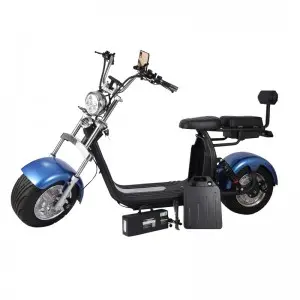As e-scooters gain popularity, more and more people are turning to environmentally friendly and cost-effective transportation options. One popular option is the Citycoco electric scooter. While these vehicles offer many benefits, many scooter owners are unsure of their tax obligations. In this blog, we’ll take a closer look at whether your Citycoco electric scooter is taxable.
Learn how Citycoco electric scooters pay tax
As with any vehicle, tax requirements for e-scooters such as the Citycoco may vary depending on jurisdiction and local regulations. Generally speaking, vehicle-related taxes are mainly related to registration tax, license tax or sales tax. However, specific conditions may vary in different regions. Let’s explore the most common tax considerations for Citycoco e-scooter owners:
1. Registration and licensing fees
In many countries, e-scooters (including Citycoco models) may require registration and licensing, just like other road vehicles. This process involves obtaining a license plate and adhering to specific regulations set by local traffic authorities. While this may initially incur an expense, it ensures the legality and roadworthiness of your scooter. Please be sure to check the laws in your specific area to determine if you need to register and license your Citycoco electric scooter.
2. Sales taxes and duties
Depending on the country or state you live in, you may be subject to sales tax when purchasing a Citycoco electric scooter. Sales tax rates can vary, so it’s important to research and understand the tax requirements in your area. If you import your scooter from another country, you may also be required to pay customs duties, further increasing the total cost of your scooter. Contacting local authorities or a tax professional can provide you with accurate information about these taxes.
3. Road tax and emission charges
Some regions impose special taxes or charges on vehicles, including e-scooters, to fund road infrastructure and promote environmental awareness. For example, some cities impose road taxes or congestion charges aimed at reducing traffic and emissions. These fees are usually levied based on the emissions of conventional vehicles, but e-scooters may be exempt from these fees due to their environmentally friendly nature. However, it is vital to regularly check local regulations and update on potential changes to road tax or emissions charges.
When it comes to taxation on Citycoco electric scooters, it’s crucial to understand the specific regulations in your jurisdiction. While most jurisdictions require licensing and registration, sales tax and duties may also apply depending on your location. In addition, road tax and emission charges may or may not apply. To ensure compliance with tax regulations, it is best to consult with your local transportation department or a tax professional who knows the laws in your area.
Citycoco electric scooters are convenient, flexible and reduce environmental impact. Understanding your tax obligations allows you to enjoy your scooter while complying with local regulations and contributing to the overall well-being of your community. So before hitting the road, make sure you’re familiar with the tax requirements for your Citycoco electric scooter to ensure a seamless and legal riding experience.
Post time: Nov-04-2023


